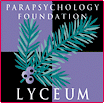 |
 |
 Click here for the PF Lyceum Site Index
PF Lyceum Blog #12, July 27th, 2006 Athena Drewes, Psy.D. (For a biography of Guest Blogger Dr. Athena Drewes, click here.) “My four year old daughter seems to know what I am thinking. When I was in the kitchen washing dishes and wishing to myself that I had a clean towel to dry them with, she went to the linen closet and brought over a fresh towel without being asked.” A child or teen who displays paranormal abilities is not odd or weird. The child or teen should be thought of as being talented in a particular area, but looks, acts and plays like any other child. The difference is that the psychic abilities are often so pronounced that they cannot be hidden. The child cannot deny them and may in addition have unusual sensitivities, such as being more affected by a casual rejection or emotional experience or may be more reactive to the emotionally confusing states of others. Research has not been able to find a specific reason for or source of such abilities. There is the possibility that there may be a genetic component, as many families report that other family members have similar abilities. It may be that each of us has such abilities, some more strongly than others, just as is true of other talents such as drawing or playing a musical instrument. Children appear more open minded and less skeptical about such experiences and as a result may talk more about them. However, research has not found that any one age group has more psychic ability than another. The following books are recommended:
Listen to your child without judgment. Create an accepting environment of understanding and caring, without ridicule, so that your child will not be afraid to speak about their experiences. Allow your child to talk freely about their experience. Casual comments such as, “Oh you picked up what I was thinking,” “Isn’t that interesting” or “Tell me more about your dream and why you think it will come true” helps the child to open up. Normalize the experience. Let your child know that children and even adults have similar experiences, and there has been research conducted on this. Let your child know there are places to get answers to their questions if they want. (For a list of organizations, click here and scroll down.) Do not force the child to “perform” their abilities. Children’s psi experiences will often be spontaneous and the child will most likely not be able to control such events at will. Never focus on using psychic abilities for personal gain or show. Such approaches may actually cause abilities to decline, result in feelings of being exploited, lead to an inflated sense of ability or force the child into resorting to fraudulent activities to keep the attention on them. Put psychic abilities in perspective. The child should be helped to understand that while they may be talented in psychic abilities, they have other things to learn and other talents to develop. Let your child be a child, not treated as a little adult. Encourage your child to develop all their abilities and see that their psychic abilities are like any other talent or skill that people have like being a gifted pianist, composer, artist, actor or athlete. Keep communication open. If your child tells you about a psychic experience, accept what has happened, whether you believe in it or not. If a child’s statements are received negatively, your child may not approach you again about any other experience, psychic or not. They may try to suppress their abilities, lose creativity, withdraw or develop feelings of distrust and anger. Keep a journal of psi experiences. Encourage your child to record such events or dreams. Write them down as soon as possible after it occurs to keep information fresh and get the most details as possible. Over time patterns may emerge. Journal writing also helps to discover which category the experience belongs in, and whether the information was accurate or not. Try to add documentation after precognitive or clairvoyant events occur to see how accurate details were and how long it took before the event “came true.” Record the times the events did not seem to occur or significant details were missed. Often psychic impressions come through when there is minimal interference and the conscious mind is not distracted by other things, such as during sleep, during car rides or when daydreaming. Often the content of events are about friends and everyday things or family members. Try out simple ESP games. Guessing games can be used to see if your child can draw a picture of an item or say the word that you are thinking of. Have 25 M & M candies, five each of five colors (red, green, blue, yellow, brown) in a brown paper bag. Select one candy and hold it inside the bag and see if your child can guess which color will come out. Then put the candy back in the bag, shake the candies up and repeat the procedure again for a total of 25 times. Record each candy selected and your child’s response. A score of 5 correct out of 25 is considered chance, the usual number when no psi phenomena may be occurring. A score of seven or higher or four or below can indicate psychic abilities. The author welcomes comments, questions, and reports of children’s psychic experiences. Athena Drewes, Psy.D.
|
 |

|
 www. parapsychology. org |
||